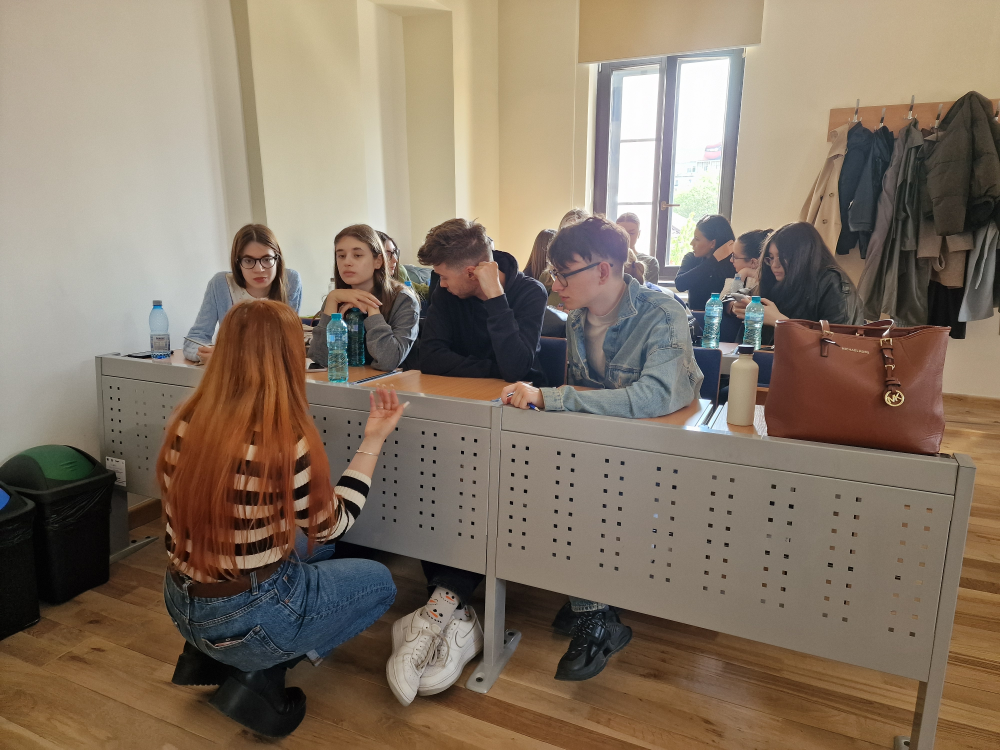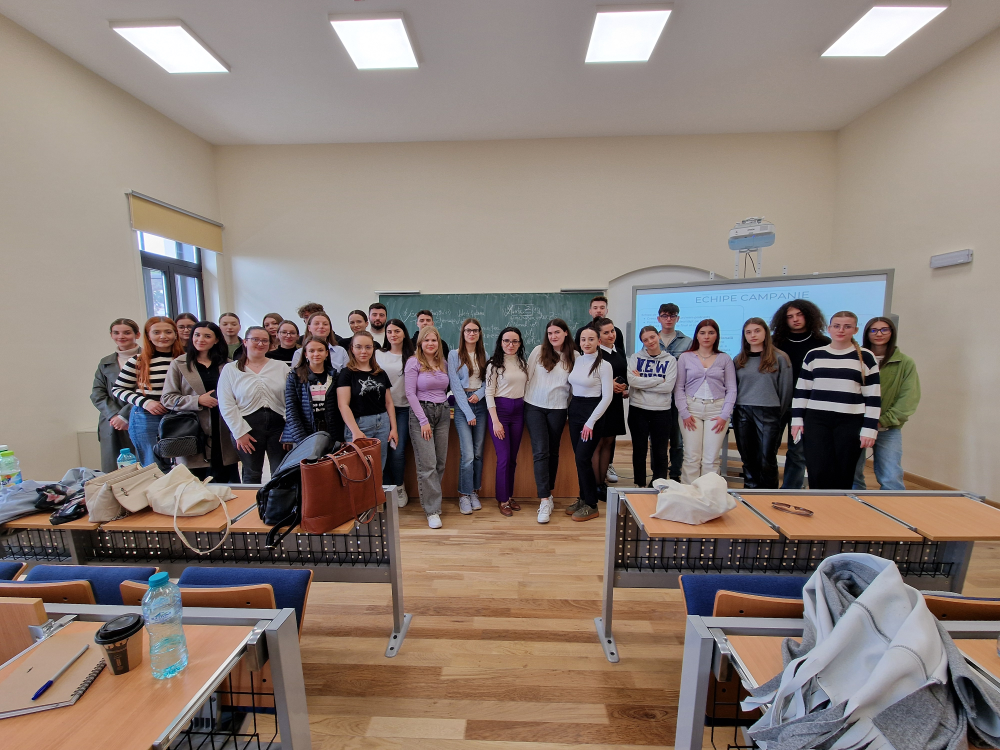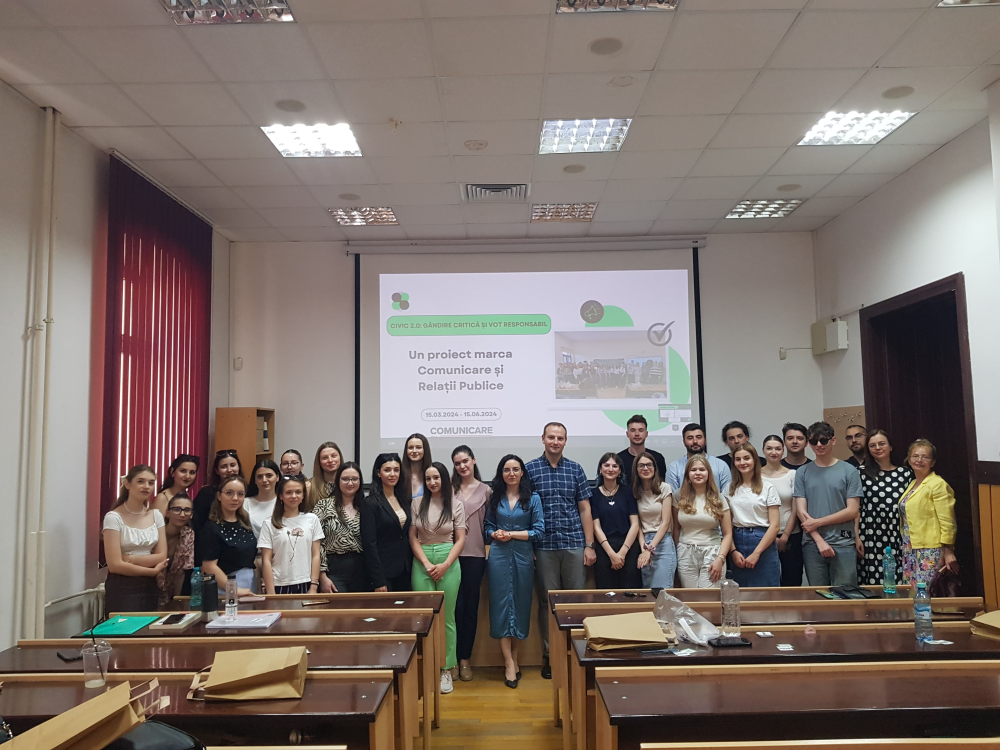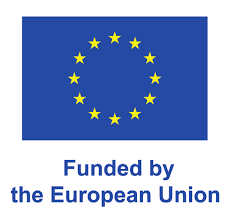Project Overview
Our "Civic 2.0: Critical Thinking and Responsible Voting" project aimed to enhance critical thinking skills and raise awareness about the importance of civic engagement among 30 Communication and Public Relations students from „Alexandru Ioan Cuza” University of Iași.
We kicked off the project with a short research study, engaging 67 students (20-24 years old) across 8 focus groups. Our goal was to understand how young people perceive civic engagement and their relationship with fake news. The insights we gained were eye-opening and laid the foundation for our next steps. Our preliminary results showed:
What Motivates Youth:
Feeling Involved: Young people have a strong desire to feel involved and express their opinions.
Making a Difference: There's a genuine drive to bring about change.
Social Integration: Being part of a social group is a significant factor.
Challenges Young People Face:
Lack of Information: Many young people feel uninformed about politics.
Negative Perceptions: There's a widespread negative view of politics and politicians.
Engagement Trends:
Community Over Politics: Young people are more involved in community activities than political ones.
Limited Civic Knowledge: While they might sign petitions, their engagement often stops there.
Passive News Consumption: News find them; they rarely seek it out actively.
Fact-Checking Gap: Many have limited knowledge about fact-checking.
Understanding Critical Thinking: They know what critical thinking is in theory, but applying it can be a different story.

Using the research findings, we developed a comprehensive training curriculum for our 30 dedicated students. The curriculum focused on critical thinking and the importance of being well-informed, particularly when it comes to voting.



Armed with their newfound knowledge, our students designed and launched an online awareness campaign. Their mission was to highlight the significance of participating in elections and ensuring voters are well-informed, with a focus on first-time voters. The campaign was successful because the students worked as a communication agency split into well-defined departments. Due to their academic background, their work was professional.

Moreover, they were motivated by the fact they target young people as they are, in this way being able to use GenZ language and a friendly approach.
The campaign had a 229,083 online reach on social media, and 3,272 visits on the accounts.

We wrapped up the project with a follow-up event, showcasing our journey and the results we achieved. It was a moment of pride and reflection on how far we had come since the project's inception.
Quotes from participants:
"Given that it was the first time I voted, this project truly provided me with first aid for voting. Everything I learned throughout this project was truly useful."
"My experience in this project was educational; I learned new things about how I can get involved civically or how I can identify fake news. It also motivated me and helped me understand the importance of voting and why we should exercise this right."
"It was a new experience for me, from which I learned how to manage an awareness (and information) campaign in a useful and usable way. I enjoyed testing an area I hadn't accessed before, namely, creating informative and entertaining video content. I can't wait to see what the next 'campaign projects' you will propose, hoping to be part of the project team again."
Challenges Faced
One of the toughest parts was recruiting the 30 students needed for the project. We didn't anticipate how difficult it would be to attract students to participate. We offered extra seminar benefits, assured them of our support throughout the project, and even managed to have their project activity counted as an internship. Once they joined, however, the students expressed their gratitude for our persistence. This experience highlighted a reluctance among students to commit to long-term voluntary projects without clear and immediate benefits.
Achievements and Impact
Despite the recruitment challenges, the project's achievements were incredibly rewarding. Coordinating the activities and watching the students' progress week by week was immensely satisfying. The culmination of our efforts was the final event, where students shared what they had learned and how they had embraced our goals.
Reflecting on the project, there are several things we would consider doing differently. We would allocate more time for research, incorporating a quantitative component to complement the qualitative insights we gathered. Smaller teams, with a maximum of three members each and a dedicated mentor, would likely lead to more consistent involvement. More frequent physical meetings could strengthen team bonds, an idea also suggested by the students.
Conclusion
The Local Action addressed a pertinent issue among its target audience, as young people are particularly susceptible to disinformation and generally disinterested and uninformed about politics. Nonetheless, they show a willingness to engage in civic activities when they feel heard and valued.
An advantage of this project was its approach: an awareness campaign crafted by young people for young people, employing a GenZ-friendly approach.
A critical takeaway is that making politics and combating disinformation more engaging and accessible is essential for effectively reaching and involving young audiences in such initiatives.
If you want to enhance your expertise in combating disinformation, check out the courses on HiveMind and get in touch with other experts across the world.
The "Civic 2.0: Critical Thinking and Responsible Voting" project was managed by Alexandra Gherguț-Babii, critical thinking expert and assistant professor at "Alexandru Ioan Cuza" University of Iași. Alexandra runs projects that focus on combating disinformation, media literacy, and critical thinking.
E-mail: alexandra.babii@yahoo.com
Instagram: https://www.instagram.com/babii.alexandra/
Facebook: https://web.facebook.com/alexandrab.alexandra/
LinkedIn: https://www.linkedin.com/in/alexandrababii/
Author: Alexandra Gherguț-Babii
Photos and illustrations: VoteZ
The Learning Groups are part of the Empowering Europeans Against Disinformation (EEAD) project, implemented within TechSoup Network’s #DigitalActivismProgram, funded by the European Union.
